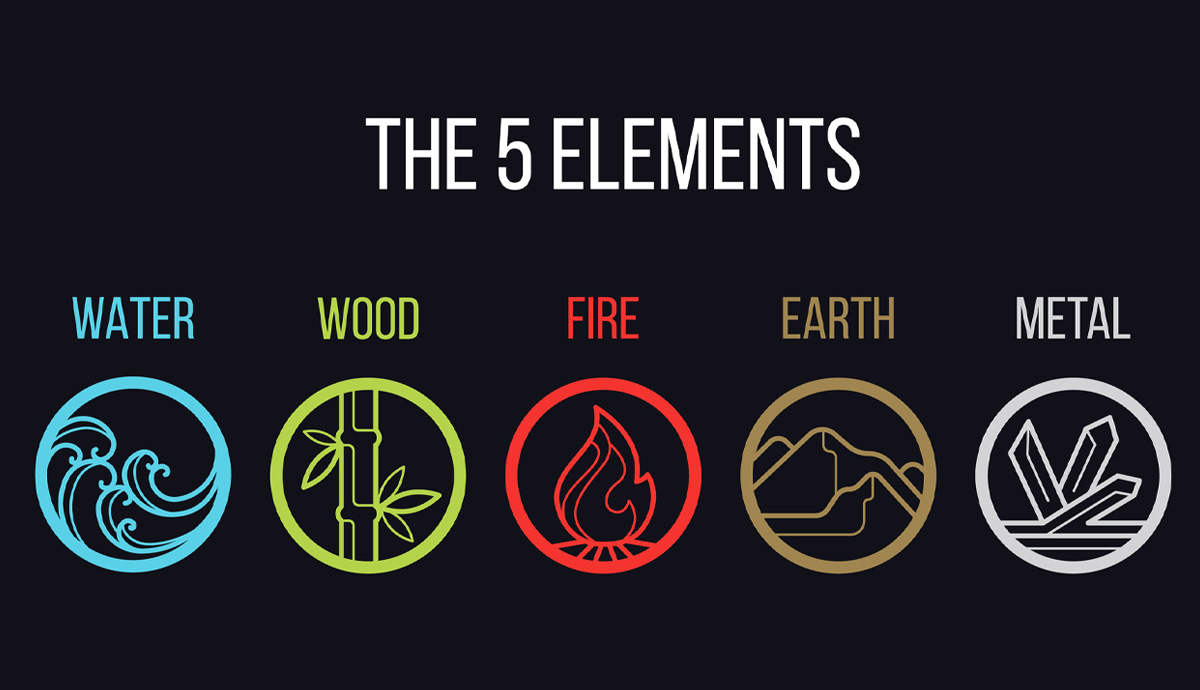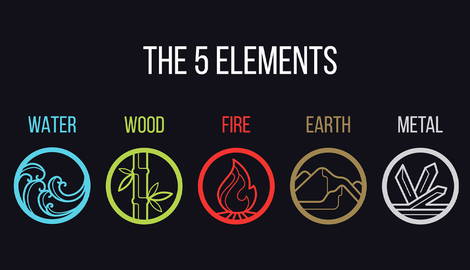
The Five Elements, also known as Wuxing in Chinese philosophy, have been a core concept that originated more than 2,000 years ago. It assumes that the entire object in the universe, including human beings and facets of nature, comprises five connected elements: Wood, Fire, Earth, Metal, and Water. Each element possesses essential characteristics and qualities that influence nature, people, and relationships.
So, what does each element symbolize, and what is its meaningfulness from the viewpoint of Chinese philosophy?
The Origins of Wuxing in Chinese Philosophy

The origins of Wuxing go back to Ancient China, specifically during the reign of the Han dynasty (206 BCE-220 CE). However, its concept has already been alluded to by earlier texts.
The term “Wuxing” first appeared without specifically referring to the five elements in Guo Yu (Discourses of the States) of Western Zhou in the eighth century BCE. Precursor concepts to Wuxing would set the stage for and secure its place as a cohesive system, part of a series of ideas from cosmology to Yin and Yang theory and divination.
Wuxing has many precursor concepts in Chinese philosophy, which would form it into a cohesive system. Scholars believe these predecessors merged into one unified system during the Han dynasty.
The Wuxing concept attained a certain meaning and crystallization in this period in many influential texts of this epoch, such as the Shangshu (Book of Documents) and Huainanzi (The Book of Master Huainan). In these works, each element, Wood, Fire, Earth, Metal, and Water, was explained with certain properties and symbolisms.
Wuxing believes in its inter-beings with nature and explains phenomena within the natural world and human existence. The elements are not merely understood as physical substances, but also represent energetic forces or principles.
Wood

Wood represents the important stages of growth and movement as one of the important elements in the Chinese philosophy Wuxing, or Five Elements. Although often related to the physical Wood, its symbolism is far more than this material, reaching to embrace several attributions and aspects.
Physically, Wood symbolizes trees and other plants–the living organisms that grow and continue to adapt to their surroundings.
In the same manner, people influenced by the energy force of Wood have such characteristics as being resilient or having a very strong personal drive towards growth. Usually, they are competitive, passionate, and adaptable to what they want to achieve.
Just like the way the branches reach outward towards the sunlight, those in tune with the energy of Wood naturally extend their feelers when it comes to new opportunities–spreading out their wings in exploring or pursuing new possibilities and opening up to new horizons. They possess a visionary spirit that allows them to set goals and work diligently towards manifesting their dreams.
According to Chinese cosmology, Wood is representative of springtime, when all things are awakening and starting again. It is an energy related to rebirth after a long hibernation during winter.
People influenced by Wood are enthusiastic about new beginnings and can take appropriate action to generate momentum in many spheres of life.
In traditional Chinese medicine, Wood also corresponds to the energetic and physical liver. It symbolizes our enthusiasm and physical detoxification through the function of the liver and the body’s and mind’s ability to process emotions healthily.
However, excessive Wood energy may lead to an impulsive or overbearing nature. People with strong Wood energy need to balance growth with patience and sensitivity by showing concern for others’ needs.
Wood’s energy can help one move forward in personal and spiritual development. It stimulates openness to change, creativity, and following dreams. Embodying the attributes associated with Wood, including being flexible and adaptable and constituting a growth attitude, will result in personal reforms and expansion.
Fire

Under the Chinese philosophy of Wuxing, Fire exists in the stage of prosperity and forms the second phase under this concept. It thus represents such properties as dynamism and upward movement and has been characterized as Yang in character. Fire has many symbolic associations corresponding to its elements and features.
In its physical form, Fire is a powerful force that consumes and transforms. People influenced by Fire tend to have a dynamic and charismatic nature. They create an atmosphere of wise people with enthusiasm and inspire others with their mental power and passion.
The Fire is associated with qualities of creativity, vitality, and ambition. Desires run people aligned with this element, have a strong will, and know exactly what they want to acquire. They enlighten any situation they find themselves in and can bring change to the world with determination.
Within traditional Chinese cosmology, Fire symbolizes summer–the season of warmth and always the plentiful fulfillment of the fruits of one’s life. As Fire only offers heat and light, those under its influence offer warmth in relationships and a fiery passion in relation to their aspirations in life.
Moreover, Fire symbolizes a spiritual awakening and knowledge. It is the warming of consciousness and transformation of the inner self. People in resonance with this element desire to search for “self” and aspire to gain enlightenment on their spiritual path.
However, if Fire is in excess, then those dominated by it might be quick to be aggressive or impulsive in their behavior. Those influenced by this element should thus find balance in expressing their passions without being overwhelmed and destructive.
Earth

Earth is represented as the soil in its physical form that provides a ground for growth and maintenance. Much like the life of plants supported in the ground, those who fall under the influence of the energy of Earth inherently possess the ability to provide support, stability, and care for the people around them. They are often seen as reliable friends or family members who offer a sense of security.
Earth is associated with being practical, patient, and reliable. People reflected in this element are known to be realistic deal-makers and determined workers. They handle issues carefully and with hard work to move small, step-by-step progress towards their goals.
In Chinese cosmology, Earth is aligned with late summer in the season of bountiful growth before the harvest. Those influenced by Earth tend to have a nurturing nature; they cultivate harmonious relationships and create a sense of belonging in their communities.
Moreover, in traditional Chinese medicine, the functioning of the digestive system–namely the spleen/stomach meridian–is also linked to Earth. It represents our ability to process food and emotionally “digest” experiences that have been metaphorically compared to eating something.
However, excessive attachment to stability can lead to stagnation or resistance to change for people in line with Earth’s energy. They have to understand the need to be flexible and adaptable to grow and evolve.
Harnessing the energy of Earth can be beneficial for personal and spiritual growth. It instills a sense of stability and nurturance in both oneself and others. Impersonating these characteristics can result in the development of patience and reliability as well as laying a firm foundation for success.
Metal

Metal is the fourth of the elements after Wood, Fire, and Earth, respectively, and before Water. Metal indicates solidity, efficiency, exactness, and structure, symbolizing or representing strength and steadiness.
Metal stands for organization, discipline, striving, and determination. Physically, it represents various objects, such as iron or steel, for tools or weapons.
In the same way, refining and purification produce Metal and shape its inertness to suit useful purposes, individuals associated with this element are willful and disciplined in their pursuits.
Metal extends its qualities beyond mere physicality; it also relates to the intellectual aspects. People influenced by the energy of Metal extend to be reflective with strategic thinking with value logic and analysis. They are very good at ensuring that rules are followed or keeping order because they have an innate ability to distinguish right from wrong.
Speaking about traditional Chinese cosmology, Metal is associated with autumn and the process described above: harvest. It signifies a time for gathering resources and reaping rewards for the individual’s hard work throughout the year.
Like how Metal maintains its solid configuration despite external forces aiming to break down, individuals aligned with this element can possess endurance amidst challenges.
Metal is not without its negative aspects, though–it can sometimes be rigid or inflexible. This rigidity is akin to being stuck in one’s ways, excessively critical, or perfectionistic.
Understanding and properly using that “Metal energy” may help one better oneself personally and spiritually. It helps individuals develop discipline, structure, and a strong sense of purpose. Embracing the Metal element can assist in cultivating mental clarity, focus, and efficient decision-making.
Water

Water takes the fifth element according to its sequence and precedes Wood, Fire, Earth, and Metal. It stands for fluidity, adroitness, wisdom, and introspection.
Water does not have shape; in its physical form, it merely takes on the shape of whatever container it is poured into. Similarly, people influenced by Water’s flow of energy are adaptable and versatile in what they do. They would be able to go with the flow quite well and navigate their way through life’s situations, most often with ease and grace.
Water is associated with the qualities of wisdom and insight. Just as a still lake reflects what lies above, those under the influence of Water often possess great self-knowledge and understanding of others. They have an intuitive nature, which helps them see beyond the obvious and pick underlying emotions or what is left unsaid.
In Chinese cosmology, Water relates to winter–a time of hibernation and rest before the birth of something new. It embodies the energy of meditation and introspection. People under its influence have the power to seclude themselves and utilize introspection to mature spiritually.
Besides, the Water symbolizes emotional intelligence. Since just as a gentle stream may soothe or a raging river may overpower, the individuals related to this element tend to possess strong emotional awareness. They’re mindful of their own emotions deeply while possessing empathy towards others’ feelings.
However, excessive Water energy may cause the person to stagnate or make them overly sensitive. One aligned with Water must find a balance between emotional depth, allowing emotions to flow freely without being carried away.
So, What Does Wuxing’s Philosophy Teach Us?

Chinese philosophy Wuxing constitutes a profound understanding of the interrelatedness of dynamics of nature, human character qualities, and personal growth.
Each and every element–Wood, Fire, Earth, Metal, or Water–expresses particular qualities and attributes that reflect properties of change and existence within each state of transition.
Wood represents the vitality of growth and flexibility, motivating characteristic attributes of resilience, ambitions, and creativeness. The element of Fire puts up in its proper quality vibrant dynamism stimulating intensity of enthusiasm, ambition, and momentum of change.
Earth brings steady support and growth that would translate to practical qualities such as dependability, common sense, and nurturance, among others. Metal, the fourth element, consists of the strength of solidity, where discipline and orderliness are found to foster such qualities as organization, determination, and piety.
Finally, qualities present in Water are fluidity’s capacity combined with the wisdom that works as a level of expression for adaptability, emotional intelligence, and reflection.
Therefore, Wuxing’s philosophy of life promotes balance and harmony, both from within and in our dealings with the environment around us. It provides a context for our self-awareness, making it possible to grapple with life experiences with composure and sensitivity.










